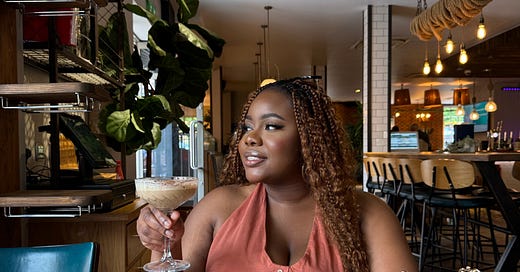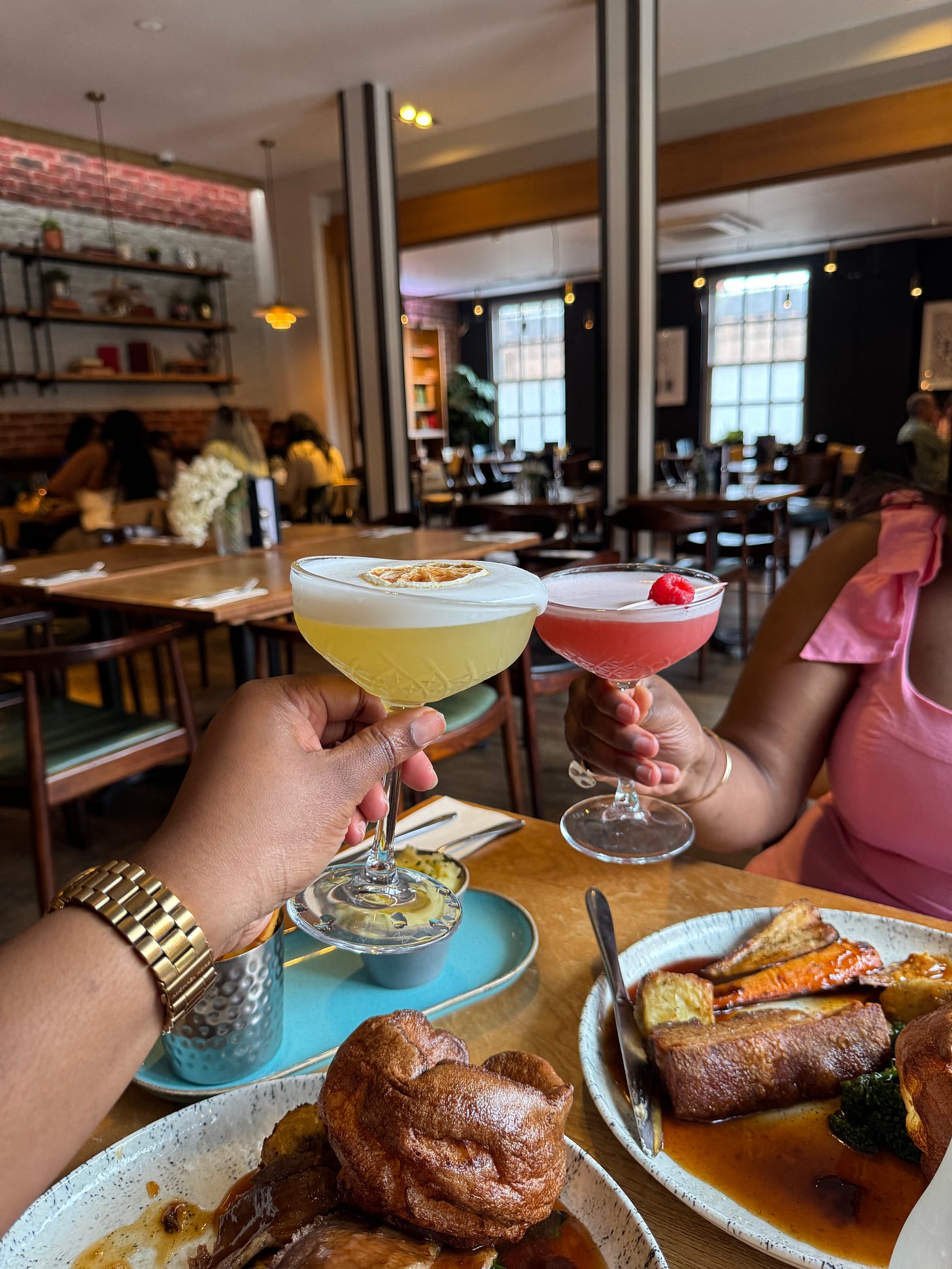“You rock the biggest pity parties, always feeling sorry for yourself, always the victim. Life has been cruel to you. Yes. But your head is stuck so deep in your arse you don’t realise you’ve been blessed too. Burdens and blessings. Just like everybody else.”
He sighed, and his voice went soft. “You’re nobody’s victim, Ukela. I don’t know how you’re going to do it — God or therapy — but you need to unfuck your mind, big time. Save yourself.”
Excerpt From: A Broken People's Playlist, Chimeka Garricks
“Yommie, you’re brave, you’re strong, and you’re going to be okay,” I whispered into the mirror, my voice trembling. I had just taken a bath, my first in days. The water didn’t feel healing, just necessary. I had cried so hard my lashes wouldn’t stick. My life felt cluttered and in shambles. Nothing made sense. The bills were overwhelming, my career felt like a game of musical chairs with no music, and mentally I was hanging on by a thread.
“At least you’re pretty,” I told myself. It was half a joke, half a lifeline.
My mind wandered to Ebuka, my ex. Maybe I should have just married him. He was rich. A provider. He made me feel cared for, in the way a strict father might. With rules. With silence. With control. He was condescending. He chipped away at me quietly. But he paid my bills. He gave me freedom, even if it came at the cost of my dignity. I could have lived the soft baby girl life with him, cushioned in luxury and denial. But its not the kind of woman I am.
“I hate being an independent woman. It’s so difficult.”
I reached for my old Gucci bag, still in pristine condition. I stepped into my Manolo Blahnik heels, slipped into a pale gold Elie Saab dress I’d bought at a deep discount but treated like couture, and straightened the bone-straight wig Ebuka had gifted me years ago. I looked like a woman who had it all figured out.
Physically, the years had been kind. My skin glowed. My cheeks were plump. My eyes held that baby doll sparkle, soft and wide, always masking pain. My lips were full, painted in Mac Ruby Woo-like armor. Everything about me screamed, “put together.”
And then there was my body, with soft curves shaped by time and experience, each one a gentle reminder of the meals shared, the embraces given, the seasons passed.
But it was a performance.
The outfit, the Uber Exec, the small talk I’d prepared for Aisha, it was all theatre. A carefully curated illusion of a woman who had made it. Of a woman who wasn’t unraveling. Of a woman who didn’t just spend the last three nights crying into her pillow, begging God for direction.
Aisha had chosen the Ritz in London for our catch-up. Of course, she had. Afternoon tea in an institution of quiet opulence. Not flashy, just impossibly polished.
We weren’t best friends back in school, but we were always cordial. Pleasant. We had a great relationship. She was warm, even then. But I’d always been aware of the class difference between us. Even in high school, it was impossible to miss. I came from hustle. She came from legacy.
She walked into the Ritz like grace itself. Effortlessly powerful. She wore a navy blue Alexander McQueen suit, tailored with quiet precision. Her Jimmy Choo heels made the kind of sound that made people turn and look without knowing why. On her arm was a black Birkin, real and worn-in, the kind that isn’t bought but earned through legacy. Her hair was pulled back into a sleek bun, tucked neatly into a soft black hijab that framed her face softly. Her diamond studs sparkled faintly, subtle yet undeniable.
Aisha’s father had been a three-time senator in Nigeria, and an early investor in cocoa, oil, and real estate. A business tycoon with a sprawling conglomerate. She had grown up between Abuja, Geneva, and London. Boarding school in Switzerland. University at LSE. Everything about her said Privilege. Access. Safety.
She stood when she saw me.
“Yommie, babe, you look stunning,” she said warmly, kissing the air beside my cheek. Her scent lingered, light and expensive, probably Maison Francis Kurkdjian.
I smiled. “So do you, my darling.”
She ordered champagne and caviar without even glancing at the menu like it was muscle memory. I scanned mine like I hadn’t already researched the cheapest items the night before. When the waiter came, I smiled politely and ordered a side salad with sparkling water. It felt safe. Controlled. Manageable.
We eased into the catch-up like old friends, even though time and distance had lived between us. We talked about life in Abuja, about all the wild parties, the table reservations that didn’t need confirmation, the weekends that started on Thursdays, and the champagne that never stopped flowing. She told me about gala events, embassy dinners, and charity balls. I told her about Birmingham, burnout, balancing work, and trying to keep my head up while figuring out who I was in a city that never stopped moving.
Then she looked at me, really looked. “How’s life, honestly?”
And for the first time in a long time, I didn’t lie.
“I’m not okay,” I said. “Things are hard. I’m struggling.”
She didn’t blink. She nodded.
“I’m impressed you left Ebuka,” she said softly, like a confession. “That’s something I don’t think I could ever dream of doing.”
And it hit me. She meant it.
I would give anything to have even half of Aisha’s wealth. Her security. Her options. But there she was, looking at me like I was the brave one.

Aisha’s Perspective
I’d always liked Yommie. Even in secondary school, she had this light around her. Vibrant. Smart. Bold in a way that didn’t feel performative. She was ambitious, driven, caring, empathetic, and so joyful. She seemed to see me in a world surrounded by fakes. I loved her for that.
She walked in like a vision. That kind of beauty you don’t dress up, you just enhance. But I’ve been raised around powerful women who wear poise like perfume. I know when it’s real. And I know when it’s heavy.
Her hug was warm but restrained. Her laughter was bright but edged with something I couldn’t name. I watched her hands, her pauses. She looked expensive. But her eyes looked tired.
So I asked.
And she told me.
And something in me cracked.
Because I wasn’t okay either. Not really.

My hijab doesn’t just frame my face. It frames my life. It keeps me in line. It reminds me who I am allowed to be and who I’m not. I wear it with pride, yes. But it is also the symbol of the cage I’ve been placed in by my husband, my family, and a society that thinks women like me only need beauty, wealth, and obedience to thrive.I know that every woman’s experience is different, and this is simply my journey with the hijab.
I was married to a man who called himself a partner but treated me like a property. Umar was everything my parents wanted for me — wealthy, pedigreed, and presentable. But I was policed. Watched. Measured. My clothes, my tone, the way I sat, the way I spoke. Every part of me is curated for public consumption. I hadn’t been allowed to work since we got married. I wasn’t even allowed to drive myself. I lived in a mansion that echoed with silence. I had staff, but no freedom. Jewellery, but no joy. I wanted a divorce. But women like me don’t leave. We endure. For the family name. For the magazine covers. For the curated image of elegance and stability.
I’ve begged for space. For breath. For purpose. And every time, I’m told, “You have everything. What more could you possibly want?”
What I want is freedom.
To walk through the world like Yommie does. Not recklessly, but openly. To laugh from my belly. To cry without shame. To choose. Even just once. I’d give anything to move through life with that kind of childlike freedom, the kind that says I belong to no one but myself.
She didn’t know that my father’s empire was shrinking. That we were quietly selling off assets, terrified of scandal. I lived in a marble mansion but cried in the dark, silk sheets clinging to my skin like loneliness.
And yet there she was, broke, brave, and unbeholden to anyone.
She left Ebuka. Walked away from wealth. From safety. From being “kept.” That kind of courage? I couldn’t even imagine it.
And in that moment, I didn’t feel pity. I felt awe.
We finished our drinks. Laughed a little. Sat in the silence. Two women performing less.
There was no grand epiphany. Just an honest connection in a room designed for perfection.
That conversation changed our friendship forever. We didn’t walk away closer because of shared success, but because of shared truth. Two women from different worlds, bound together by the quiet relief of being seen.
Social Media & Buy Me a Coffee
If you enjoyed this article, please share it on social media! You can find me on Twitter (@theyommie) and Instagram (@yomiolusunle). Every share helps amplify the message! ☕️
I write with the help of coffee (and a passion for great storytelling!). If you'd like to support my work, feel free to buy me a cup through my Buy Me a Coffee.
Your bubbly neighborhood slay queen,
Yomi





